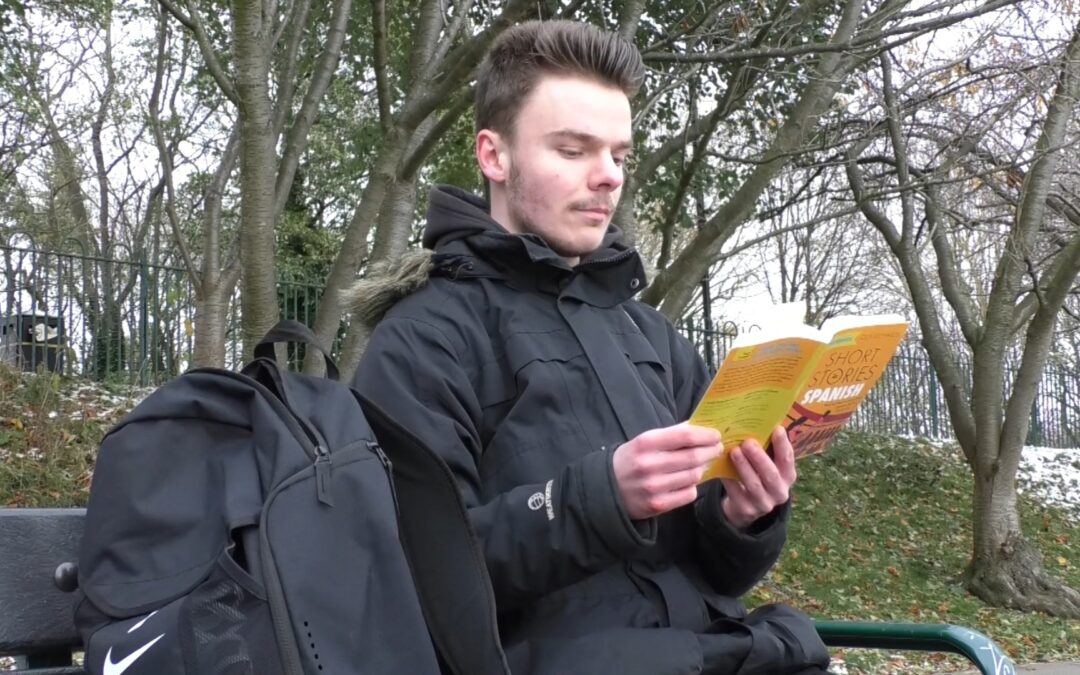Nelson Walker has spoken to language teachers, students and academics to uncover the challenges of learning languages and reveal how people can enjoy the process much more and enrich their lives.
Learning foreign languages does not need to be reduced to cramming French verb conjugations, German articles and passing exams. They can be immense tools to enhance our lives. Yet, language learning is in a deeply precarious moment in the UK. In 2019, the BBC reported that foreign language learning was at its lowest level in UK secondary schools since the turn of the millennium. In the same year, the British Academy reported: “The UK is currently nowhere near to fulfilling its linguistic potential. The global nature of English does not make up for that underperformance, which is worsening each year.” The All-Party Parliamentary Group on Modern Languages has also stated: “The UK’s language deficit is holding us back economically, socially and culturally. We need to reverse this. The UK is in a languages crisis.”
As the UK forges its future beyond the European Union following Brexit, it is unclear how much of an impact the UK’s withdrawal from the European trade bloc has had on the perception of language learning in the country. However, what is clear is that the nation’s overall track-record of learning languages has been declining for a long time. In Northern Ireland, the numbers taking modern languages at GCSE fell by 40% between 2003 and 2019. It begs the pivotal question: how can we reverse this debilitating trend and become better language learners?

BBC Infographic demonstrating the fall in take-up of some modern foreign languages at GCSE level between 2002 and 2018. Can be accessed here: https://www.bbc.co.uk/news/education-47334374
The background: Why are some people more successful at learning languages than others?
Rebecca Archer is a French teacher at Garstang Community Academy in Lancashire and believes there are a myriad of reasons why some students are more successful than others in the language learning process, many of which linked to the current educational system. “The previous GCSE was 50% exams and 50% coursework. As well as the difficulty in the course and in the exams themselves (now 100% exams) we have also got less time on the timetable. We have a reduced number of hours to deliver the content to the students.”
For her, it is also about work-rate and application. “It is definitely down to attitude, 100%. It shows dedication. Some students who have come from more privileged families are not used to pushing themselves as far as they could do. All of them want to do well but 30 or 40% think ‘I want to do well but I know that I have to work hard to do well’.” In the BBC report, many schools cited the perception of languages as a difficult subject as the main reason behind a drop in the number of pupils studying languages for their exams. Research into the fall in modern foreign language take-up in the UK has also reinforced the idea that some students think it is more difficult to get good grades in languages than in other subjects such as science or history.
Overcoming hurdles in the language learning journey:

Photo of chapter from Olly Richards’ Spanish Intermediate Short Stories book.
Obstacles and hurdles are inevitable in the language learning journey. Learning a foreign language is a marathon not a sprint and along the path there tend to be bumps in the road, of different shapes and sizes. According to Victor Gabriel Ferreira, a final year undergraduate flute and musicology student at the University of São Paulo in Brazil, and also a passionate language learner, obstacles can be best negotiated through changing your learning strategy. He discovered that the strategy of writing words down in a notebook did not work for him, but thinking to himself in his target language did. “You have to change. If you are encountering an obstacle that you cannot overcome, it is maybe because you do not have the most suitable method for you. There are things you do now but that you will not necessarily do one year from now. The language learning journey is not static. If you encounter a problem you cannot overcome, change your way of learning.”
Miriam Küpper is an MA Journalism Studies student at the University of Sheffield who has taught both English and German as foreign languages. She believes going back and reflecting on the progress you have made as a language learner is to key to overcoming hurdles in the journey. “I always say to my students, look back at what you already learned because they are often surprised, looking back, at what they already know instead of focusing on what they don’t know. Just going back to the basics. For example, if they struggle with a new case, going back to the cases that they already know, going back to articles, and then going step-by-step and building it up. Often when they see the journey they have already gone through, they realise ‘OK, I can actually do this; this is not that hard, I have done harder things already’.”
How learning foreign languages can change your life:
According to Stefan Oloffs, the creator and owner of the German Language Coach private teaching and tuition company based in London which helps people to develop their German language skills, languages can be an excellent vehicle for gaining new knowledge. “People learn about the culture. It is not just about the language. It is a lifestyle. It opens up a whole new world. Our body language in German is different to body language in English. They will pick it up. Just that little ice-breaker makes all the difference. Know that and use that to your advantage.”
Nicola McLelland is Professor of German and History of Linguistics at the University of Nottingham and she believes learning languages can not only enhance your life but also your brain too. “There is evidence that learning a language benefits cognitive skills. I think you get a chance to think in a different way. It feels brain changing and life changing. You are discovering a different way of being.”
Language learning in the online era: What does the future hold?

Photo of language learner listening to podcast in Crookes Valley Park.
The online era has ushered in a whole new dawn for language learning. Gone are the days when people would be bound to cassettes and dusty old textbooks. Globalisation and the rapid expansion of the Internet has spawned a plethora of resources, applications and role models out there for people to take advantage of. For Victor, this brings a wealth of opportunities. “I am learning Korean. I am here in South America, very far away. The Internet in the last few years was a game-changer. I think this is probably the best time to learn a language. Nowadays, instead of travelling, you can create your own immersion. You can listen to French music, you can watch French films, you can speak to French people on the Internet and you can write a diary on the Internet and get corrections on your French. You can do so many things, only in French, without leaving your house.”

Photo of language learner about to start listening to an ‘Hoy Hablamos’ Spanish podcast episode on Spotify.
For Miriam, this is also transforming the way in which students learn languages. “I started out in a classroom environment and now I am solely teaching online just because the success rates are much better. Generally I think having all those online opportunities offers so much more for students because if they want to progress in their own time they can, and it is so much easier providing them with extra material.”
Languages teacher Mrs Archer is fully aware of the challenges the educational framework in the UK faces when it comes to learning languages. “I would love to be optimistic however I do think that changes need to be made. Changes need to be made to change the overall perception of languages. I hope in the years to come we will see a positive change and people start to appreciate languages for how amazing they are.”

